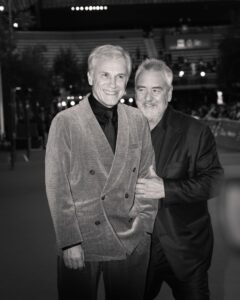- Italian
- English
Il nuovo film di Luc Besson ridisegna il mito di Dracula e sceglie Roma come primo palcoscenico.
Alla Festa del Cinema di Roma è arrivato uno dei titoli più attesi del cartellone internazionale: Dracula – L’amore perduto, la nuova opera di Luc Besson che riporta il mito del vampiro sul grande schermo spostando l’asse dalla paura all’amore. Presentato nella sezione Grand Public, il film è stato accolto come un evento cinematografico che va oltre l’aspetto spettacolare, trasformandosi in un esperimento culturale: rileggere una delle figure più iconiche dell’immaginario europeo attraverso lo sguardo dell’intimità.
Besson sceglie di non percorrere la strada del gotico puro né quella del puro mainstream. Il suo Dracula è un uomo prima che un simbolo, segnato da una perdita che precede la maledizione. L’orrore non è più ciò che fa paura allo spettatore, ma ciò che consuma il protagonista dall’interno. È un film che rimette al centro l’origine del personaggio – l’amore spezzato – e lo usa come lente narrativa.
Il cast contribuisce a consolidare questa lettura emotiva: Caleb Landry Jones offre un Dracula fragile e tormentato, lontano dalla postura del predatore tradizionale, mentre Christoph Waltz e Zoë Bleu arricchiscono il racconto con una presenza che non invade, ma amplifica. In modo discreto, anche la presenza di Matilda De Angelis inserisce una sfumatura tutta europea, un sottotesto culturale più che estetico, che rende coerente la scelta di Roma come luogo della prima proiezione.
È un’attrice capace di recitare con la stessa naturalezza in italiano e in inglese e che esce dagli schemi classici dell’attrice italiana, portando una dimensione interpretativa più ampia.
Quanto a Luc Besson, resta un regista dall’anima sensibile, che cerca sempre di indagare la natura umana — e in questo caso la natura “dell’altro mondo”. È noto da tempo per aver proclamato l’amore come la forza più importante, persino più della religione e della politica, e questo film non fa eccezione.
Portare questo film in anteprima proprio alla Festa del Cinema di Roma ha un significato che va oltre il prestigio del festival. Roma è oggi uno dei pochi contesti europei ancora capaci di garantire uno spazio narrativo a opere che non puntano solo all’impatto commerciale, ma alla dimensione simbolica. Dracula – L’amore perduto non arriva come titolo da competizione, ma come racconto da condividere con un pubblico disposto all’ascolto.
La presentazione nella sezione Grand Public è stata un gesto autoriale: non una proiezione per gli addetti ai lavori, ma una restituzione diretta allo spettatore. Durante la conferenza stampa Besson ha spiegato che il cuore del film non è la maledizione, ma la possibilità — quasi impossibile — dell’amore che sopravvive al tempo. È un Dracula che non chiede di essere temuto, ma compreso.
L’anteprima romana conferma che questo non è un film pensato per rinnovare il mito in chiave pop, ma per restituirgli densità. In un panorama in cui molte narrazioni legate ai grandi personaggi classici vengono semplificate o serializzate, Besson sceglie la via opposta: riportare il personaggio alla sua tragedia fondativa.
Non rumore, ma profondità.
Non estetica, ma motivazione.
Dracula – L’amore perduto arriverà nelle sale italiane il 29 ottobre 2025, distribuito da Lucky Red, in tempo per la stagione autunnale e per il periodo simbolicamente legato al mito del vampiro. L’anteprima di Roma funziona così come soglia: un passaggio dal festival al pubblico, senza intermediari.
Luc Besson’s new film reshapes the myth of Dracula and chooses Rome as its first stage.
At the Rome Film Fest, one of the most anticipated titles of this year’s international lineup arrived: Dracula – Lost Love, a work that brings the vampire myth back to the screen by shifting the focus from fear to longing. Presented in the Grand Public section, the film was received not merely as a spectacle but as a cultural experiment, rereading one of the most iconic figures of the European imagination through the lens of intimacy.
Besson avoids both the purely gothic approach and the fully mainstream route. His Dracula is a man before he is a mythological creature, marked by a loss that precedes the curse. Horror is no longer what terrifies the audience, but what corrodes the character from within. The film restores to the center the original wound of the figure – a love broken by death – and uses it as the guiding narrative key.
The cast reinforces this emotional perspective: Caleb Landry Jones plays a fragile and tormented Dracula, far from the stance of a traditional predator, while Christoph Waltz and Zoë Bleu give depth to the story with a presence that amplifies rather than overwhelms. Matilda De Angelis provides a subtle European undertone that makes the choice of Rome as the site of the premiere fully coherent. She is an actress capable of performing naturally both in Italian and in English, stepping outside the traditional mold of the “Italian actress” and bringing a wider interpretative range to the screen. As for Luc Besson, he remains a filmmaker of deep sensibility, always searching for the human nature beneath the myth — and in this case, the nature of the “other world.” He has long affirmed that love is the highest force, more powerful than religion or politics, and this film is no exception.
Bringing this film in world premiere to the Rome Film Fest carries a meaning that goes beyond the festival’s prestige. Rome remains one of the few European contexts still capable of giving narrative space to works that do not seek only commercial impact, but symbolic resonance. Dracula – Lost Love did not arrive as a competition title, but as a story shared directly with an audience willing to listen.
Its presentation in the Grand Public section was an authorial gesture: not a screening for insiders, but a direct restitution to the viewer. During the press conference, Besson explained that the heart of the film is not the curse, but the almost impossible persistence of love across time. This is a Dracula that does not ask to be feared, but understood.
The Roman premiere confirms that this is not a film meant to modernize the myth for popular consumption, but to restore its tragic core. In an era when many classic narrative figures are simplified or serialized, Besson moves in the opposite direction: he restores density rather than reducing complexity. Not noise, but depth. Not aesthetics, but intention.
Dracula – Lost Love will arrive in Italian cinemas on October 29, 2025, distributed by Lucky Red, in time for the autumn season and the period most symbolically connected to the vampire myth. The Rome premiere thus becomes a threshold — the passage from festival to audience, without intermediaries.
By author















